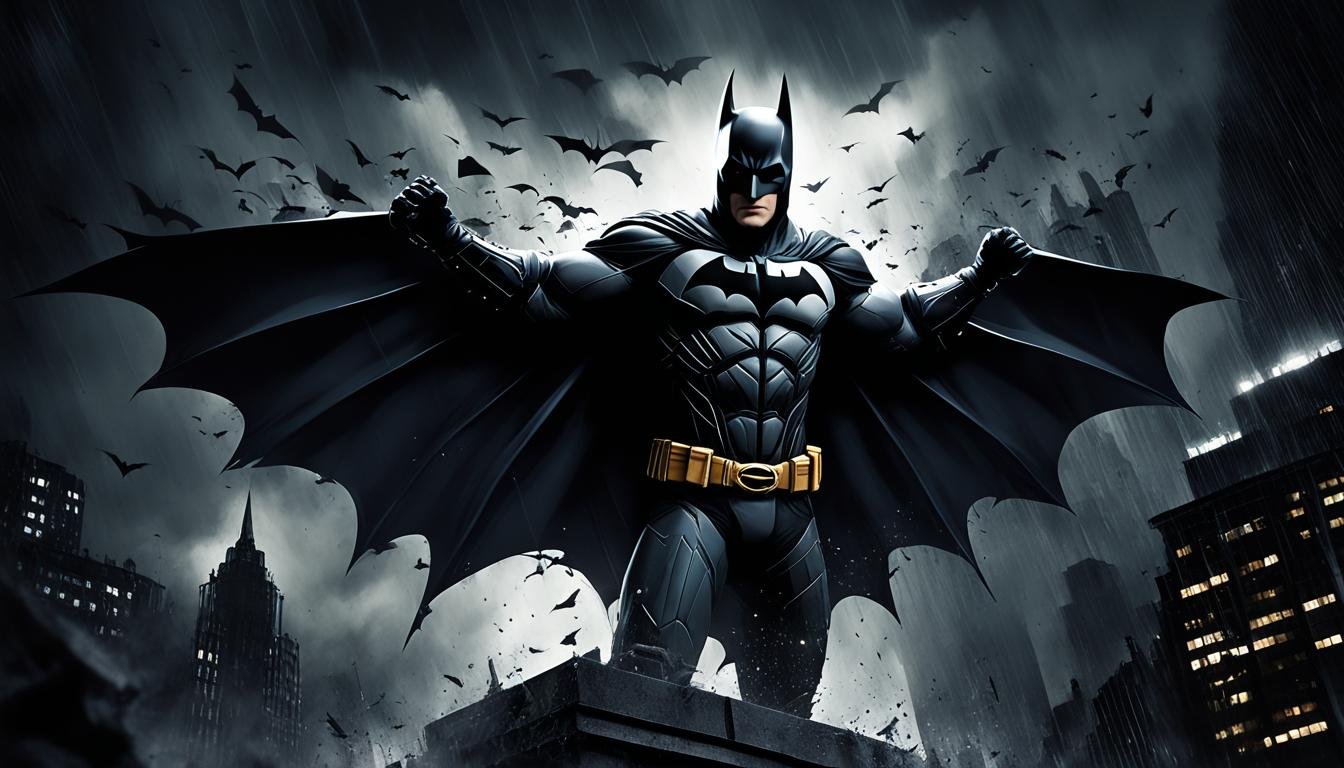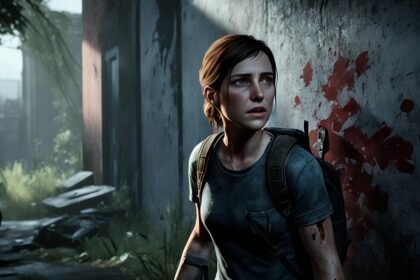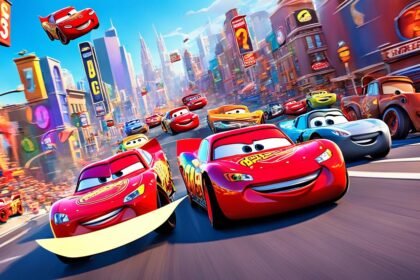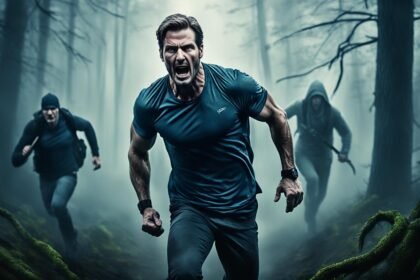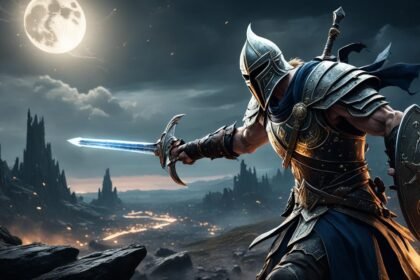“The Dark Knight” looks into the good and bad within us, exploring the fine line between order and chaos in Gotham. It was both directed and written by Christopher Nolan, assisted by Jonathan Nolan in writing. The movie covers morality, justice, power, corruption, heroism, and sacrifice alongside how societies work.
The movie gained a lot of praise thanks to its amazing cast. Christian Bale starred as Bruce Wayne/Batman, with Heath Ledger as the Joker, and Michael Caine as Alfred Pennyworth. Gary Oldman also played James Gordon. Heath Ledger’s Joker stood out, pushing against traditional ideas of right and wrong through chaos and disorder.
As the movie moves towards its big moments, we see the ideals and choices of its characters tested. The Joker tries to reveal Batman’s identity. A ferry problem pushes Gotham’s people to their limits. When Harvey Dent turns into Two-Face, it brings another level of disorder. Batman then chooses to bear the blame for Harvey’s bad deeds to keep hope alive.
The decisions various characters make in the movie are crucial. For example, Coleman Reese’s choice not to tell Batman’s secret. Plus, we see how the Joker’s actions lead Harvey Dent to a dark place. Batman’s sacrifices add to these deep themes, exploring the grey areas of right and wrong, the value of keeping secrets, and the effect of chaos on our morals.
“The Dark Knight,” the 2008 sequel in Nolan’s Batman series, was highly praised. It got eight Oscar nominations, winning in two categories. Heath Ledger earned the Best Supporting Actor award, highlighting his incredible performance as the Joker.
Aside from its critical success, “The Dark Knight” was a blockbuster, earning over a billion dollars worldwide. It changed how superhero movies were seen, focusing more on characters and themes that make us think. It showed superhero films can be deep and thought-provoking.
Key Takeaways:
- The Dark Knight explores themes of morality, justice, power, corruption, chaos, heroism, sacrifice, and societal structures.
- Heath Ledger’s portrayal of the Joker challenges societal norms through chaos and anarchy.
- The movie’s climax involves pivotal events that test the characters’ ideologies and choices.
- The Dark Knight received critical acclaim, earning multiple award nominations and winning two Oscars.
- The film’s influence on the superhero genre is significant, setting a new standard for character-driven narratives and darker, more realistic themes.
The Complexities of Batman’s Character
Batman, the Dark Knight, explores deep themes like trauma and identity. In 1939, Bob Kane and Bill Finger created him for DC Comics. Since then, Batman has become one of the most famous superheroes. His story from the tragic loss of his parents to his fight against crime shows the deep impact of grief.
The struggle between Bruce Wayne and his alter-ego, Batman, shows us the power of dual identity. Bruce presents himself as a rich, carefree socialite, while Batman stands for justice and frightens wrongdoers. This contrast shows how we all struggle to keep our true selves hidden.
In Christopher Nolan’s much-loved trilogy, Batman’s character is thoroughly examined. High praise has been given to his role, especially in The Dark Knight, where Heath Ledger’s Joker also shines. This Joker portrayal is often seen as one of the best in cinema history.
Examining the films, experts focus on three parts: the characters, the story, and the elements. They analyze characters like Bruce Wayne and Batman separately. This gives a full view of each character’s growth and complexity.
The Dark Knight and The Batman films are compared, looking at the characters and their impact. It shows the variety in how Batman is portrayed on screen.
The Dark Knight’s story is often described as structured yet chaotic, reflecting its intense plot. The film’s ability to switch between different stories and keep viewers interested is often praised.
Harvey Dent in The Dark Knight and Selina Kyle in The Batman are highlighted for their impact. The review also compares The Batman’s Riddler with past Batman villains. A superhero movie’s quality is said to rely heavily on its villains.
Each film is analyzed deeply, covering the story, character growth, and impact on Batman’s legacy. These analyses give a deeper understanding of Batman’s character and the role he plays in pop culture.
| The Dark Knight Trilogy Ratings | |
|---|---|
| Batman Begins | ⭐⭐⭐⭐⭐ |
| The Dark Knight | ⭐⭐⭐⭐⭐ |
| The Dark Knight Rises | ⭐⭐⭐⭐ |
Batman stands for hope, justice, and the ongoing fight against evil. His story, dual identity, and the interaction of his different personas capture our minds. Batman has made a deep mark on superhero stories.
The Cognitive Abilities of Batman
Besides his awesome strength, Batman has amazing thinking skills. He’s known as the World’s Greatest Detective. With his sharp mind, he solves tough problems and outsmarts bad guys.
Batman is a keen observer. He sees every little detail. This helps him get important facts and see connections others miss. His smart brain lets him study clues, find patterns, and solve mysteries.
Batman tackles problems with a clear, smart plan. He looks at things from many sides and thinks through every possibility. This helps him make strong plans and guess what his enemies will do before they do it.
His power of deduction is what makes Batman special. Even with just a little info, he can figure things out. Thanks to his know-how in areas like science and crime, he can solve tough cases. He’s always a few steps ahead of the bad guys.
Batman also uses his skills beyond fighting. He’s great at hiding his identity and can speak many languages. His deep knowledge of science helps too. These skills make him a well-rounded superhero.
“Detective work is not just about solving crimes; it’s about understanding the human condition, unraveling the depths of evil, and bringing light to the darkest corners of Gotham City.” – Batman
For 80 years, Batman has shown us the power of our minds. He teaches us that being strong is about more than muscles. It’s about using your brain, seeing things clearly, and thinking smartly even when things get tough.
The Cognitive Demands of the Superhero Profession
Batman’s thinking skills show us what superheroes face mentally. They need to be smart, not just strong. Thinking clearly, solving problems, and figuring things out are key to their work for justice.
Studies show staying active, both physically and mentally, can help keep your mind sharp as you get older. Doing things that make you think can prevent your brain from getting worse as you age.
The mental work of superheroes is similar to real-life detectives and scientists. Doing this work helps superheroes stay sharp and think well. It’s like exercise for their minds.
Just like being active helps your body, staying mentally engaged keeps your mind sharp. Batman’s choice to seek justice and truth shows the value of keeping your brain busy.
Explore more about Batman’s cognitive abilities in the table below:
| Cognitive Abilities | Impact on Batman’s Feats |
| —————————————- | ———————————————————————————————- |
| Sharp observation skills | Allows Batman to gather vital information and details that lead him closer to solving crimes |
| Analytical thinking | Enables Batman to devise effective plans and strategies in combating criminals |
| Deductive reasoning | Helps Batman solve complex puzzles and unravel intricate mysteries |
| Vast scientific knowledge | Enhances Batman’s problem-solving abilities and aids in the development of advanced gadgets |
| Multilingual proficiency | Facilitates communication and infiltration in various settings |
| Mastery of various scientific fields | Provides Batman with a broad understanding of criminology, forensics, and cutting-edge technology|
| Superior memory and recall abilities | Assists Batman in retaining vast amounts of information and recalling details quickly |
| Proficiency in disguise and undercover work | Enables Batman to infiltrate criminal organizations and gather intelligence |
Batman’s thinking skills are legendary, making him more than just a superhero who fights. He’s a problem-solver too. His sharp mind and clever deductions show how important brain power is in the world of superheroes.
The Burden of Responsibility
Gotham City is in trouble with crime and corruption rampant. One man stands in the way, bearing its safety on his back: Batman. In “The Dark Knight” by Christopher Nolan, Bruce Wayne, played by Christian Bale, faces deep moral dilemmas. He struggles with the heavy responsibility of being Gotham’s guardian.
This film really gets into Batman’s mind. It shows what it takes to keep playing the hero. But it also highlights the tough decisions and even sacrifices that must be made. Batman faces a rise in crime that really pushes the line on what is right and just.
“The Dark Knight” shows us that Batman’s job is hard. It makes us think about what’s more important, his own needs or what’s best for the city.
Heath Ledger as The Joker really ups the ante on the ‘bad guy’ role. His unsettling portrayal puts Batman and the city on the defense. The chaos The Joker brings contrasts sharply with Harvey Dent’s struggle, making the movie’s story richer.
Nolan’s approach uses real places instead of a lot of computer effects. It gives Gotham a gritty, authentic feel. The choice to film mostly in Chicago for real makes the city’s woes feel very real to us.
“The Dark Knight” really dives deep into what it means to be a hero. It challenges how we see good and bad, with a main character who is far from perfect. It helps us all remember that choosing what’s right isn’t always easy, and it can change everything.
| Key Themes | Statistics |
|---|---|
| Bruce Wayne’s Burden of Responsibility | Christian Bale portrays the burden of responsibility that comes with power |
| The Testing of Ethics in Gotham City | The film explores themes of escalation, crime fighting, corruption, and the testing of ethics in Gotham City |
| The Disruptive Nature of The Joker | Heath Ledger’s portrayal of The Joker as a disrupter contrasts him with the emotional arc of Harvey Dent |
| The Realism of Gotham City | The use of practical locations and minimal CGI provides a sense of credibility to the film |
The Silent Struggle
Batman, the Dark Knight, is often seen as a silent hero. He keeps his feelings hidden to focus on saving Gotham City. This makes him a great warrior but also raises questions about his mental well-being.
Studies reveal that Batman chooses to hide his feelings. This makes him a stoic hero. It shows he pays a hidden emotional cost for his brave actions.
However, his act can be harmful. Constantly ignoring feelings is tough on the mind. This can lead to mental health issues over time.
Global and detailed studies show that depression is a common problem. Batman fits the bill of someone who struggles internally but keeps up a strong front. He bravely fights his battles alone but does so with a purpose.
Depression often makes people push others away. Yet, Batman is lucky to have loyal friends like Alfred and Robin. They are crucial for his support and keep him grounded.
“You’re not alone, Bruce. We’re here for you,” Alfred said. It’s a reminder to Batman that he has a support system.
Additionally, Batman finds motivation in his depression to protect his city. He uses his struggles to find hope and light in the darkness. This reflects the idea that through hard times, brighter days are ahead.
Characters like Batman show us that hope is real in challenging times. Their stories inspire us to seek help and find a purpose, mirroring the steps towards personal healing.
When we examine Batman, we learn more than his heroic side. We gain insights into how we handle trauma, identity, and problems. His story reflects our own, showing the depth of mental health struggles and human strength.
Conclusion of The Dark Knight
Christopher Nolan’s “The Dark Knight” wraps up with lots to think about. It really makes you consider sacrifice, what’s right and wrong, and how choices shape us. This movie, from 2008, not just showed us Batman but also changed how we see superheroes.
The ending really makes us ponder what it means to be a hero. Batman never kills, showing a strong moral code. But the Joker, who plays by his own rules, pushes Gotham to the edge. In their final face-off, Batman shows true grit in his fight for justice.
Heath Ledger’s Joker sets up a twisted game with two boats. He tries to prove anyone can turn dark when pushed. Through the chaos, even Gotham’s hope, Harvey Dent, falls. The film doesn’t tie up all the Joker’s loose ends, but we guess he ends up locked away.
“The Dark Knight” wasn’t just successful, it was a phenomenon. With a huge budget, it made over a billion dollars worldwide. But its real power was changing the superhero game. It made us look deeper into good and evil, making superheroes more human. Its impact lingers, showing the strength of stories and their lessons on life.
FAQ
What is “The Dark Knight” about?
“The Dark Knight” dives into the dark side of human nature in Gotham City. It shows us how close order and chaos really are. The movie makes us think hard about the kind of people we look up to as heroes.
Who are the main actors in “The Dark Knight”?
In “The Dark Knight,” Christian Bale plays Batman, Heath Ledger plays the Joker, and Gary Oldman is Commissioner Gordon. It’s a cast filled with big names.
What is the significance of Batman’s character in the film?
Batman’s story is deep and dark, focusing on loss and identity. After losing his parents, he becomes Batman. The movie looks at the big difference between who we are and who we show the world.
What are Batman’s special abilities?
Batman is more than just muscle; he’s a brilliant detective. His analytical skills and problem-solving make him a unique kind of hero.
What is the burden of responsibility that Batman carries?
Batman has Gotham’s safety as his top priority. He learns that leading comes with a heavy emotional toll. The movie is about how hard it can be to stay the course and make the right decisions.
How does Batman cope with his emotions?
Batman doesn’t show his feelings much; he keeps them inside. This shows how being a lone hero can affect mental health. He chooses to be strong and silent.
What are the themes explored in the ending of “The Dark Knight”?
In the end, the movie looks at sacrifice and making tough decisions. It makes us think about what it really means to be a hero. “The Dark Knight” changed superhero films, giving them a more real and serious tone.


